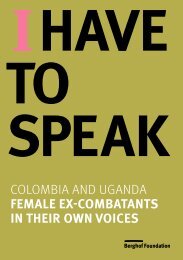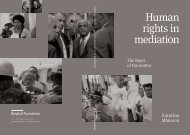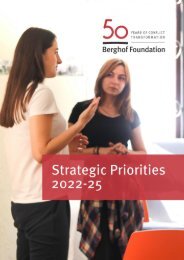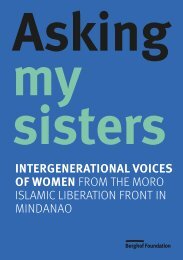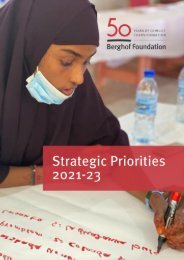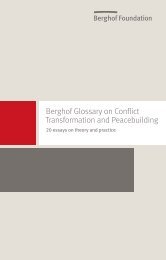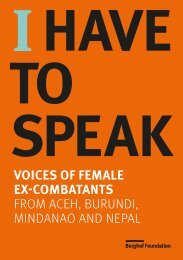Berghof Foundation: 50 years of conflict transformation
This book provides an overview of the Berghof Foundation’s work and impact over the past 50 years and sheds light on the challenges ahead of peacebuilding.
This book provides an overview of the Berghof Foundation’s work and impact over the past 50 years and sheds light on the challenges ahead of peacebuilding.
You also want an ePaper? Increase the reach of your titles
YUMPU automatically turns print PDFs into web optimized ePapers that Google loves.
National Dialogues<br />
2017<br />
A model for<br />
inclusive<br />
political<br />
negotiations<br />
and multiparty<br />
talks?<br />
An expert panel at the Roundtable on Emerging National Dialogues in Berlin, 2015. Photo: <strong>Bergh<strong>of</strong></strong> <strong>Foundation</strong><br />
Peace talks are becoming more complex. While<br />
they have traditionally focused on ceasefires and<br />
frameworks for political reform, current negotiation<br />
processes include many more topics, ranging from<br />
power-sharing mechanisms, reform <strong>of</strong> governance<br />
systems, constitution-making, transitional justice and<br />
economic aspects to restructuring the security sector.<br />
Peace talks are also becoming more<br />
inclusive. Talks between a government on the one<br />
side and a rebel or insurgency movement on the<br />
other are more the exception than the rule. Local and<br />
traditional actors, civil society, victims and women<br />
groups all want to have a stake in the process and<br />
representation at the table, or at least want to be<br />
heard and consulted on specific topics. Inclusivity is<br />
increasingly becoming a normative pattern. It <strong>of</strong>fers<br />
many benefits as it positively affects the acceptance<br />
and sustainability <strong>of</strong> agreements.<br />
Developments towards more complex and<br />
inclusive negotiation processes started 30 <strong>years</strong><br />
ago, when a number <strong>of</strong> countries in Eastern Europe<br />
set up roundtables with hundreds <strong>of</strong> participants to<br />
negotiate and manage the transition from communist<br />
rule to more democratic political systems. In the<br />
early 1990s, a series <strong>of</strong> national conferences also<br />
took place in Africa, starting in the Francophone<br />
countries and later extending to the multi-party peace<br />
negotiations in South Africa in 1992-99.<br />
These National Dialogues — or similar<br />
processes under different names — gained in<br />
popularity during the Arab Spring, when there were<br />
calls for National Dialogues in nearly every country<br />
<strong>of</strong> the Middle East and North Africa. In 2015, the<br />
Tunisian Quartet received the Nobel Peace Prize in<br />
appreciation <strong>of</strong> their work.<br />
However, planning and facilitating complex,<br />
inclusive negotiation or dialogue processes is a<br />
major challenge. What can be done to ensure that<br />
the process has sufficient legitimacy while still being<br />
effective enough to produce the desired outcomes?<br />
A successful National Dialogue needs careful<br />
preparation and a considerable amount <strong>of</strong> creativity.<br />
It cannot replace or create the necessary political will,<br />
nor is it a substitute for the courageous leadership by<br />
key parties that is required for a successful process.<br />
In order to help parties in <strong>conflict</strong> to address<br />
this set <strong>of</strong> challenges, the <strong>Bergh<strong>of</strong></strong> <strong>Foundation</strong> has<br />
provided strategic and process advice for over<br />
20 <strong>years</strong>. We began in Sri Lanka in 2001, when we<br />
initiated and facilitated the Resource Network for<br />
Conflict Studies and Transformation, which <strong>of</strong>fered<br />
space for dialogue to all <strong>conflict</strong> parties (including<br />
the Muslim minority) on all major topics <strong>of</strong> the peace<br />
process; later in Lebanon, we partnered with UNDP<br />
to support the National Dialogue process that had<br />
begun in 2008. From 2012-2014, we supported the<br />
preparation and implementation <strong>of</strong> the National<br />
Dialogue Conference in Yemen. A number <strong>of</strong><br />
additional National Dialogue support activities in<br />
Sudan, Mali, Afghanistan and Ethiopia followed.<br />
Since 2008, we have been providing strategic<br />
coaching to <strong>conflict</strong> stakeholders on inclusive<br />
national dialogue formats, as well as to international<br />
actors such as the EU, UN, the OSCE and a number<br />
<strong>of</strong> Ministries <strong>of</strong> Foreign Affairs. Since 2015, we have<br />
been running an annual one-week training course on<br />
National Dialogue and Peace Mediation in partnership<br />
with Swisspeace.<br />
The flagship <strong>of</strong> our support, however,<br />
is the National Dialogue Handbook: A Guide<br />
for Practitioners, which was finalised in 2017<br />
after intensive consultations and case study<br />
analysis involving academics, practitioners and<br />
representatives <strong>of</strong> the UN and the World Bank. The<br />
Handbook <strong>of</strong>fers a comprehensive, state-<strong>of</strong>-the-art<br />
overview <strong>of</strong> key elements <strong>of</strong> National Dialogues and<br />
includes 19 country case studies. It has become an<br />
important reference document in many National<br />
Dialogue processes and has been translated from<br />
English into Arabic, French and Spanish.<br />
52<br />
53




